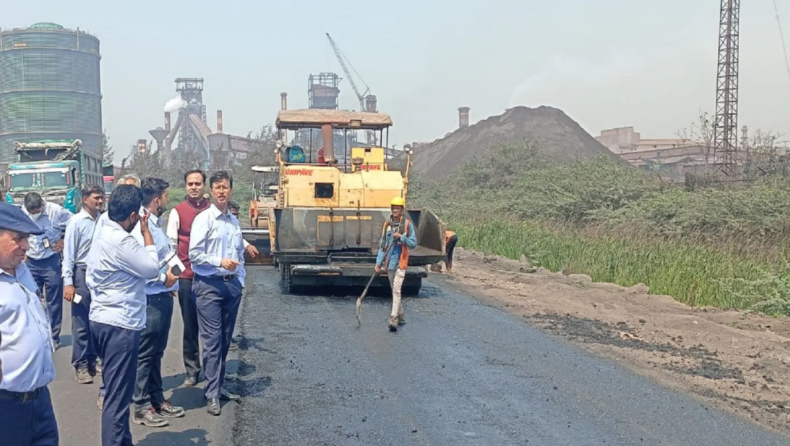India gets its first steel slag road in the city of Surat which has become the first city in the country to get a processed steel slag (industrial waste) road built as part of a joint-venture project by the Council of Scientific and Industrial Research (CSIR), Central Road Research Institute (CRRI), Union Ministry of Steel, Government think-tank NITI Aayog and Arcelor Mittal-Nippon Steel (AM/NS) at Hazira.
About the project
The six-lane public road is a kilometer-long stretch in Hazira industries which also houses the AM/NS plant was completed in early March and the road is being used by the heavy-duty vehicles of multinationals located in the industrial estate on the outskirts of Surat.
Construction began around a year ago by converting mounds of steel waste into steel slag aggregate and according to CRRI’s principal scientist Satish Pandey, the construction cost of the processed steel slag road is 30% cheaper than roads built from natural aggregates.
Scientist Satish Pandey further added, “the thickness of the road is also 30% lesser than normal ones, while the durability is much longer due to the utilization of steel slag”.
The project falls under the initiative of the “Waste to Wealth and clean India campaign”.
The process involved
The slag is generated from a steel furnace burning at around 1500-1600 degrees centigrade in the form of molten flux material as an impurity. The molten material is then poured into slag pits for cooling as per the customized procedure and further processed to develop stable steel slag aggregates with better material properties in place of the natural aggregate commonly used in road construction.
According to the Indian Road Congress guidelines for the construction of a heavy traffic road that is capable of taking the load of 1,000 to 1,200 trucks per day and around 600 to 700 mm thickness of road, layers are required on the foundation with 8% CBR (California Bearing Ratio).
In comparison to normal highways, the ones made out of steel slag are 30% less thick because of better material characteristics, and the Hazira road used around 1 lakh tons of processed steel slag.

The CRRI will now prepare guidelines and specifications for the utilization of steel slag in road construction. The parameters and performance indicators will be incorporated into the guidelines and will be given to Indian Road Congress, Ministry of Roads and Highways to utilize steel slag for the construction of national highways.
Load test
Over 30 heavy-loaded trucks use the carriageway on a daily basis. The steel slag road which is also a part of the research study has been constructed using instrumented test sections comprising strain gauges, pressure cells, displacement gauges, and thermocouples to measure load-induced deformation including the stress and strain in pavement areas.
Scientist Satish Pandey said, “They’re monitoring the temperature variation in the pavement layer using thermocouples and added further that CRRI and CPRI will further monitor its performance for another year”.
Why only Gujarat?
The Hazira road in Surat was chosen because of the proximity to the AM/NS steel plant and the availability of heavy traffic on the road for study purposes. This stretch is already in dilapidated condition and is now re-built using processed slag aggregates as per the riding standards of goods highways which will be much more durable and dependable during the monsoon.
Arcelor Mittal and Nippon Steel produce around 2 million tons of steel slag annually which can be utilized for the construction of roads.
Eco-friendly?
Surat Municipal Corporation or SMC road development department officials say the utilization of processed steel slag in road construction paves the way for sustainable use of waste and reduces the reliance on perishable natural aggregates.
This process is expected to reduce GHG emissions and carbon footprint in road construction activity and is in line with India’s commitment to United Nations SDG No. 9 for building resilient infrastructure through inclusive and sustainable industrialization and green technologies.
BR Bhatt who is the executive engineer at SMC’s Road Development Department said, “The approximate construction cost per square meter of processed steel slag is ₹1,300 for a bitumen road and ₹2,700 for a cement or concrete one but the lifespan of a cement or concrete road is over 30 years while that of bitumen and steel slag road is around 15 years.
Published By – Damandeep Singh
Edited By- Kritika Kashyap













